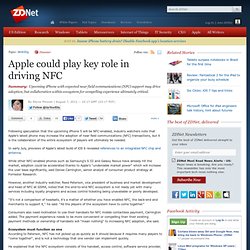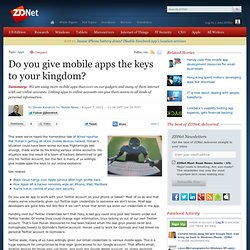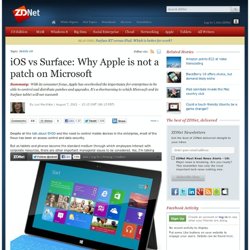

CNN-IBN Videos: Watch Last 24hr News Videos, Special News Show Videos. CNN.com International - Breaking, World, Business, Sports, Entertainment and Video News. DFI – Researcher’s proof-of-concept malware infects BIOS, network cards without trace. Security researcher Jonathan Brossard created a proof-of-concept hardware backdoor called Rakshasa that replaces a computer’s BIOS (Basic Input Output System) and can compromise the operating system at boot time without leaving traces on the hard… See on news.techworld.com.

DFI – Trend Micro expands Smart Protection Network for advanced persistent threats. DFI – Apple account hack raises concern about cloud storage – CNN.com. Republican Filibuster Kills Cybersecurity Act Of 2012 In Senate. Tech Insight: Offensive Countermeasures Help Defenders Fight Back. Cracking Services Help Secure Companies. Measuring Risk: A Security Pro's Guide. Third Parties Are IAM's Third Wheel. 10 Ways To Fail A PCI Audit. Apple could play key role in driving NFC. Following speculation that the upcoming iPhone 5 will be NFC-enabled, industry watchers note that Apple's latest phone may increase the adoption of near field communications (NFC) transactions, but it is the collaboration of the entire ecosystem of players will ultimately be needed.

In early July, previews of Apple's latest build of iOS 6 revealed references to an integrated NFC chip and antenna. While other NFC-enabled phones such as Samsung's S III and Galaxy Nexus have already hit the market, adoption could be accelerated thanks to Apple's "undeniable market power" which will increase the user base significantly, said Denee Carrington, senior analyst of consumer product strategy at Forrester Research. "It's not a comparison of headsets, it's a matter of whether you have enabled NFC, the back-end and merchants to support it," he said.
"All the players of the ecosystem have to come together. " Do you give mobile apps the keys to your kingdom? This week we've heard the horrendous tale of Wired reporter Mat Honan's getting all of his mobile devices hacked.

Honan's situation could have been worse but was frighteningly bad enough, made worse by his linking various online accounts. His situation was the result of a team of hackers determined to get into his Twitter account, but the fact is many of us willingly give mobile apps the keys to our online existence. See related: Do you use an app to work with your Twitter account on your phone or tablet? Most of us do and that means we've voluntarily given our Twitter login credentials to someone we don't know.
Handing over our Twitter credentials isn't that risky, a bad guy could only post bad tweets under our Twitter handle. Twitter aside, many of us have willingly given our Gmail credentials to various mobile apps. Apps that work with Google Reader are commonly used, and they require the Google login credentials to work. iOS vs Surface: Why Apple is not a patch on Microsoft. Despite all the talk about BYOD and the need to control mobile devices in the enterprise, most of the focus has been on access control and data security.

But as tablets and phones become the standard medium through which employees interact with corporate resources, there are other important managerial issues to be considered. Yes, I'm talking about patches and upgrades. Most IT departments today are familiar with Patch Tuesday when Microsoft rolls out updates , fixes and security upgrades to existing systems. It's been a regular occurrence since 2003 and is probably a recurring event in the Outlook calendars of most technicians. With this regularity comes familiarity and security.